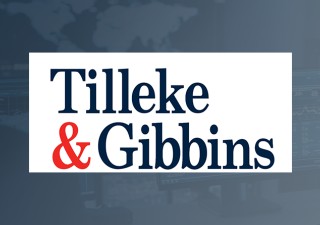New trademark law in Myanmar now in full force
31 May 2023

Myanmar’s new trademark law, which took effect on April 1, 2023, has brought in strong interest and anticipation, despite the political and economic challenges that Myanmar is facing right now. Following its implementation, multinational companies and brand owners are pleased that they have the opportunity to benefit from the full protection of their trademark rights based on a specific law that meets international standards – something that did not exist prior to April – with many brand owners enlisting help to file applications to register their marks under the new law. This includes owners of marks that had previously been registered under Myanmar’s old system, as well as businesses looking to protect their marks for the first time in the country.
For more than two decades, Myanmar has been working on drafting and implementing its new trademark law. Among the significant improvements are a first-to-file system, which brings the country’s trademark system more in line with international standards, and the introduction of a trademark office with sophisticated trademark processes and courts designated to work on trademark matters.
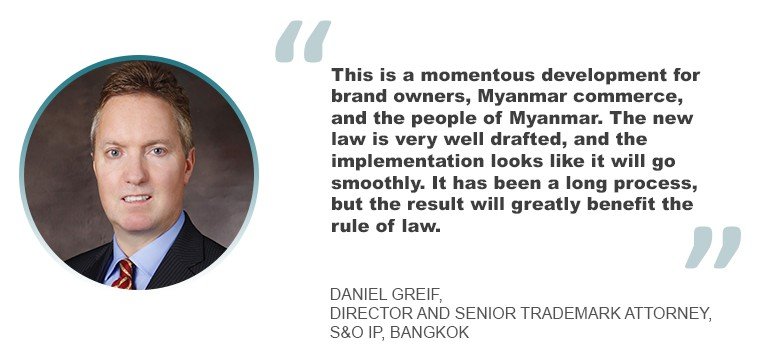
According to Daniel Greif, a director and a senior trademark attorney at S&O IP in Bangkok, these are all welcomed developments that will streamline trademark processes, bring greater certainty to the trademark system and allow legitimate brand owners to better protect their trademark rights in Myanmar.
“This is a momentous development for brand owners, Myanmar commerce, and the people of Myanmar,” he said. “The changes were necessary to further commercial development in Myanmar. The new law is very well drafted, and the implementation looks like it will go smoothly. It has been a long process, but the result will greatly benefit the rule of law and Myanmar’s ongoing process of becoming a modern, well-developed economy.”
He further said that the new law encourages early trademark registration and discourages bad-faith filings by third parties. It also provides definitive legal provisions that will be used in trademark litigations to stop infringements and counterfeits. These provisions, along with the implementation of courts designated to address trademark cases, will allow brand owners to better protect and enforce their trademark rights.
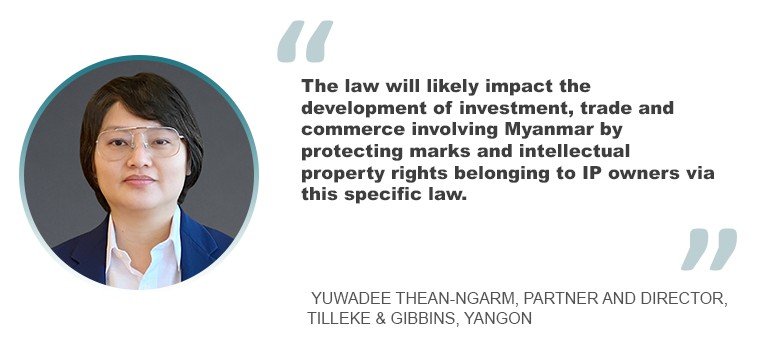
Protecting rights holders
Yuwadee Thean-ngarm, a partner and director at Tilleke & Gibbins in Yangon, said that as the Trademark Law 2019 offers IP owners (both legal entities and individuals) right relating to their marks, it protects the interests of mark owners including rights holders.
“The law will likely impact the development of investment, trade and commerce involving Myanmar by protecting marks and intellectual property rights belonging to IP owners via this specific law. Brands and businesses can be in a competitive market and environment while also remaining protected from counterfeiting of their marks and goods under the trademark law, which provides for substantive enforcement action,” she said.
This is the first specific law in Myanmar regarding marks, Thean-ngarm further said, as previous marks in Myanmar were governed through the country’s common-law practice based on the Registration of Deeds Law 2018, which replaced the Registration Act 1908.
“The Trademark Law 2019 included a provision stating that it would come into force starting on the day prescribed by a notification issued by the president,” she added. “Due to the unexpected political turmoil in the country in February 2021, the law’s enforcement remained pending for some time. To implement the new trademark system, the State Administration Council issued Notification No.82, dated March 10, 2023, specifying the enforcement date of the Trademark Law as April 1, 2023.”
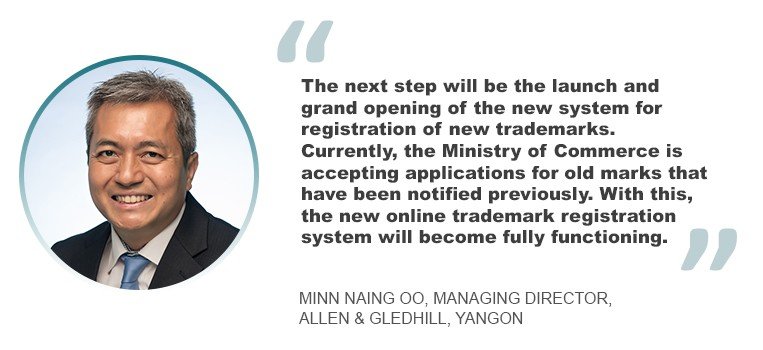
Minn Naing Oo, managing director at Allen & Gledhill in Yangon, said that the new trademark law once again marks a significant development for Myanmar, where businesses have traditionally had to rely on colonial-era laws to protect their intellectual property. It also replaces the current first-to-use system with a first-to-file system. There will also be an online registry, which will result in greater transparency, ease of registration and more certainty in determining priorities.
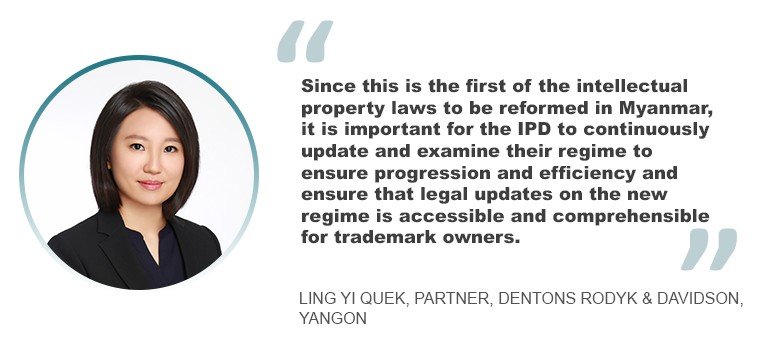
Challenges and risks
As the trademark law is the first law to be enacted among the intellectual property laws that will form the basis of Myanmar’s reformed intellectual property system, some IP lawyers see that individuals and businesses may not be aware of the new laws and procedures in place, leading to confusion and non-compliance.
“They may not be familiar with the electronic filing system as well as the specification regarding the classes and description of their marks, which poses as a further challenge,” said Ling Yi Quek, a partner at Dentons Rodyk & Davidson in Yangon.
The following are other challenges and risks that may arise with this new trademark law, Quek said:
Trademark volume and delays. As the registration process was previously carried out manually, it can be assumed that there may be numerous electronic applications and queries from the applicants regarding the new electronic system. Therefore, it may be difficult to cope in the initial stages for authorities and agencies. The Intellectual Property Department would have to ensure that they have the right resources and equipment to handle the anticipated high volume of trademark filings too. An inefficient and ineffective electronic system may result in serious delays and uncertainty for both the IPD and applicants.
Examination process. Over 40,000 applications have been filed during the soft opening period. The examination period takes around 12 to 18 months per application, excluding the time taken for the substantive examination if there is any opposition filed against the trademark. Therefore, the IPD should review and rethink the examination process regularly to improve efficiency due to the high volume of applications.
“Since this is the first of the intellectual property laws to be reformed in Myanmar, it is important for the IPD to continuously update and examine their regime to ensure progression and efficiency and ensure that legal updates on the new regime is accessible and comprehensible for trademark owners,” said Quek.
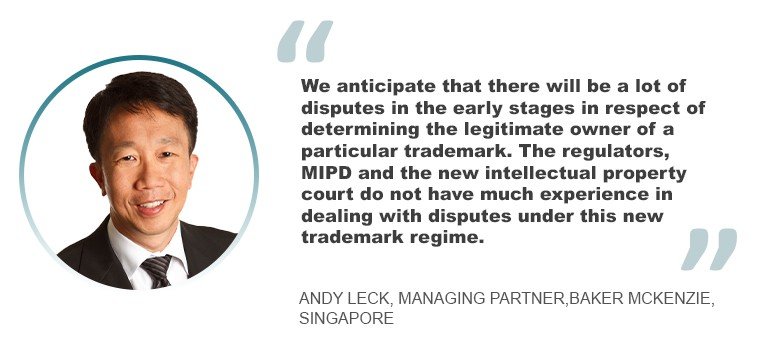
Andy Leck, managing partner at Baker McKenzie in Singapore, said that because of the first-to-file rule, where trademark rights are granted to the person who first filed a trademark application, another party can show prior use of the trademark.
“We anticipate that there will be a lot of disputes in the early stages in respect of determining the legitimate owner of a particular trademark,” he said. “Furthermore, the regulators, MIPD and the new Intellectual Property Court do not have much experience in dealing with disputes under this new trademark regime. Consequently, the outcome for any trademark disputes can be very unpredictable.”
At this stage, he recommended brand owners to collate as much evidence of prior use in Myanmar, which will support their claim that they are the legitimate owners of their respective marks.
In the coming months
According to Leck, all trademark applications under the new trademark law will first go through formality examination and substantive examination based on absolute grounds (for instance, distinctiveness) by the Myanmar Intellectual Property Department. If a trademark application passes the examination by the MIPD, it will then be published for opposition in the trademarks journal for a period of 60 days. If the trademark application is not opposed by a third party during the opposition period, the MIPD will then only publish the trademark for grant and subsequently issue the certificate of registration.
“Given that there is a high likelihood of businesses or brand owners filing trademarks which are identical and/or very similar, we anticipate that there will be a substantial volume of oppositions in the coming months,” he said.
“The next step will be the launch and grand opening of the new system for registration of new trademarks,” said Oo. “Currently, the Ministry of Commerce is accepting application for old marks that have been notified previously. With this, the new online trademark registration system will become fully functioning.”






